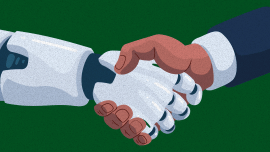Next Step / Decoding corporate lingo: what people mean, and how to ask for clarity
6 January 2026, 08:11 AM
Next Step
How the Dutch East India Company invented the MNC
6 January 2026, 08:03 AM
Next Step
Next Step / The death of the career
30 December 2025, 09:48 AM
Next Step
Laying the foundations for a stronger ICT enterprise ecosystem in Bangladesh
9 December 2025, 15:30 PM
Next Step
Next Step / Where women lead the line: a new route to RMG supervision
11 November 2025, 05:31 AM
Next Step
Next Step / The duet of man and machine
16 September 2025, 05:33 AM
Next Step
Next Step / AI - the new colleague on your desk
16 September 2025, 04:56 AM
Next Step
Next Step / A guide for Gen Z founders: Navigating Bangladesh’s unfriendly, orthodox startup ecosystem
2 September 2025, 07:11 AM
Editor's Pick
Next Step / Why soft skills could be your strongest career asset
2 September 2025, 04:02 AM
Next Step
Next Step / Why AI literacy will future-proof your career
6 August 2025, 05:23 AM
Editor's Pick









